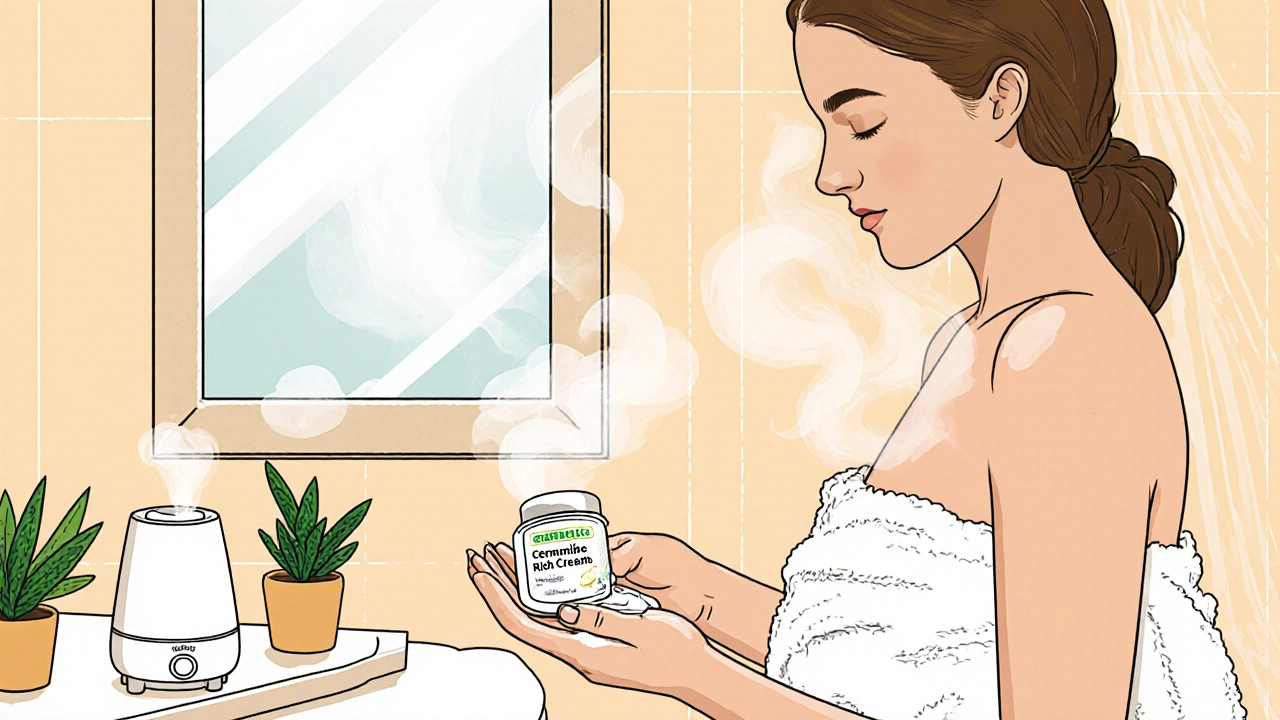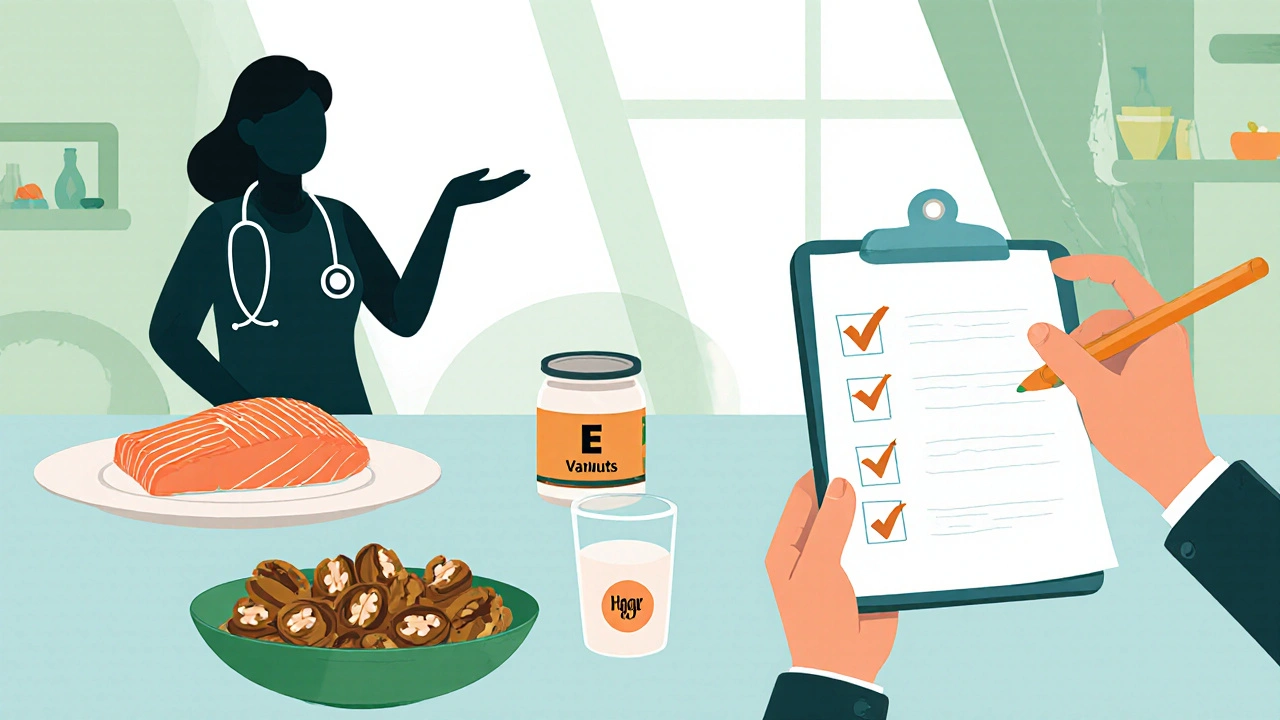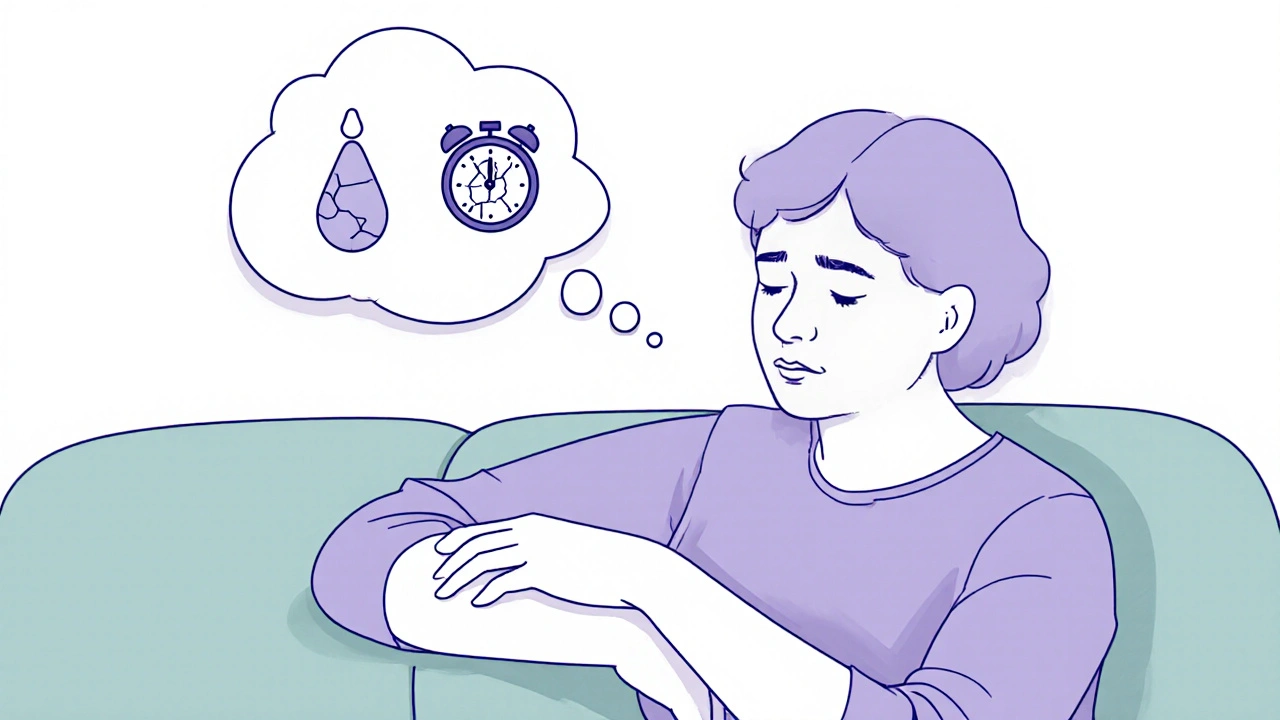Menopause Skin Moisturizer Recommendation Tool
Find Your Perfect Moisturizer
Select your current skin condition and dryness level to get personalized recommendations for menopause-related itching.
Your Personalized Recommendation
Key ingredients to look for:
Apply within 3 minutes of showering to lock in moisture effectively.
Itching during menopause is a common but often overlooked symptom that can disrupt daily life. Hormonal shifts, especially the drop in estrogen, make the skin drier and more reactive, turning a simple scratch into a persistent annoyance. This guide walks you through why the itch happens and, most importantly, how to calm it without resorting to endless creams.
Why the Skin Itches After 45
When estrogen levels fall, the skin’s natural oil production slows down. Less oil means the outer layer loses its protective barrier, leading to dry skin - a condition where the epidermis lacks moisture, causing tightness, flakiness, and itch. Add to that decreased collagen, you get thinner skin that’s more prone to irritation from clothing, soaps, or even changes in humidity.
Other culprits include:
- Hormonal fluctuation itself - estrogen influences histamine release, so a dip can boost itch signals.
- Stress - cortisol can exacerbate skin inflammation.
- Underlying skin conditions like eczema or psoriasis that flare up when the body’s balance shifts.
Quick Lifestyle Fixes
Before reaching for any product, try these low‑effort changes. They’re cheap, easy, and often enough to tone down the itch.
- Increase indoor humidity. A simple humidifier set to 40‑50% keeps the air from drying your skin.
- Take lukewarm showers, not hot ones. Hot water strips natural oils faster.
- Swap harsh soaps for fragrance‑free, sulfate‑free cleansers. Look for ingredients like glycerina humectant that pulls water into the skin.
- Pat skin dry with a soft towel instead of rubbing.
- Wear breathable fabrics - cotton or bamboo - and avoid tight elastic bands that can chafe.
The Best Skincare Routine for Menopause Itch
When it comes to products, focus on three steps: cleanse, moisturize, protect.
- Cleanse: Choose a gentle, pH‑balanced cleanser. One with ceramideshelps rebuild the skin barrier.
- Moisturize: Apply within three minutes of exiting the shower while the skin is still damp. This traps water.
- Protect: Use a broad‑spectrum SPF 30+ daily; UV rays further break down collagen and can irritate dry patches.
Which moisturizer should you pick? Below is a quick side‑by‑side look.
| Type | Texture | Best For | Key Ingredients |
|---|---|---|---|
| Ointment | Thick, greasy | Very dry, cracked skin | Petrolatum, lanolin, shea butter |
| Cream | Rich but spreadable | Moderately dry skin | Ceramides, hyaluronic acid, niacinamide |
| Lotion | Light, quick‑absorbing | Normal to mildly dry skin | Glycerin, aloe vera, vitamin E |

Nutrition & Supplements That Calm the Scratch
What you eat can help fortify skin from the inside out.
- Omega‑3 fatty acidsfound in fatty fish, flaxseed, and walnuts, reduce inflammation and improve barrier function.
- Vitamin Ea powerful antioxidant that protects skin cell membranes.
- Phytoestrogensplant compounds (soy, red clover) that mildly mimic estrogen, sometimes easing dryness.
- Probiotic‑rich foods (yogurt, kefir) to support gut‑skin axis.
Start with a balanced diet; if you consider a supplement, choose a reputable brand and aim for 1,000 mg EPA/DHA daily for omega‑3s, and 400 IU of vitamin E.
Medical Options When Home Remedies Aren’t Enough
If itching stays severe after a few weeks, it’s time to talk to a clinician.
- Topical corticosteroidsreduce local inflammation; use short‑term under medical guidance.
- Antihistaminesoral meds like cetirizine can calm itch caused by histamine spikes.
- Hormone Replacement Therapy (HRT)restores estrogen levels and often improves skin hydration.
- Prescription moisturizers with urea or lactic acid for deeper exfoliation and hydration.
Never self‑prescribe steroids or HRT; a dermatologist or menopause specialist can tailor dosage to your health profile.

When to See a Dermatologist
Schedule an appointment if you notice any of these red flags:
- Itch accompanied by a rash, blisters, or open sores.
- Persistent itch that disrupts sleep for more than two weeks.
- Rapidly spreading patches that look infected (pus, increased redness).
- Other menopause symptoms worsening, such as severe hot flashes or mood swings, suggesting a broader hormonal issue.
Quick Checklist to Tame Menopause Itch
- Use a humidifier (40‑50% humidity).
- Take lukewarm showers; limit time to 10 minutes.
- Apply a fragrance‑free, ceramide‑rich moisturizer within three minutes of bathing.
- Eat omega‑3‑rich foods at least three times a week.
- Consider a daily vitamin E supplement (400 IU).
- If itch persists > 2 weeks, book a dermatologist visit.
Why does my skin feel itchier during menopause?
Lower estrogen reduces the skin’s natural oils and collagen, leading to dryness and a weaker barrier that triggers itch.
Can over‑the‑counter creams fix menopause‑related itching?
Yes, especially moisturizers with ceramides, glycerin, or hyaluronic acid. Choose a cream or ointment depending on how dry your skin is.
Should I start hormone replacement therapy just for the itch?
HRT can improve skin hydration, but it’s a systemic treatment. Discuss risks and benefits with a doctor before starting.
Are there any foods that worsen itching?
Highly processed foods, excess sugar, and alcohol can increase inflammation and make skin dryer. Focus on whole foods and omega‑3 sources.
When is it necessary to see a dermatologist?
If the itch comes with a rash, blisters, open sores, or disrupts sleep for more than two weeks, get professional help.

15 Comments
Jonathan Harmeling
October 22 2025
Look, the skin during menopause isn’t some cursed fate you have to endure forever. It’s a signal that you’re neglecting the simplest self‑care habits, like keeping the air moist and avoiding scorching showers. Swap that scented soap for a plain, fragrance‑free cleanser and you’ll see a real difference. Moisturize while the skin is still damp – that’s how you trap water, not when it’s dry as a desert. Stop treating your body like an afterthought; it deserves a little respect.
Ritik Chaurasia
October 27 2025
In India we’ve been battling menopause itch with Ayurvedic oils for centuries, and the results speak louder than any Western cream. Stop bathing in boiling water; a lukewarm rinse paired with a dash of sesame oil is a game‑changer. If you’re scared of “chemicals,” grab a spoonful of neem paste and rub it on the patches – it’s antimicrobial and soothing. Don’t let pharmaceutical marketing fool you into thinking you need a pricey lotion every day. Get real, get natural, and you’ll feel the relief roar through your skin.
cariletta jones
November 2 2025
Great summary, super helpful! Thanks for keeping it concise.
Kevin Hylant
November 7 2025
Humidifiers are cheap and they work – set them to about 45% humidity and you’ll notice less tightness. Also, cut your shower time to under ten minutes; the less water you expose your skin to, the better. Keep the water lukewarm, not scorching, and the barrier stays intact.
Marrisa Moccasin
November 12 2025
Are you seriously trusting big‑pharma creams??? They’re loaded with hidden irritants!!! The government never tells you about the additives that keep you buying more!!! Think twice before slathering on that “miracle” ointment!!!
Caleb Clark
November 18 2025
I’ve been through the menopausal itch marathon twice, and let me tell you, the journey is a wild rollercoaster of dry patches, sleepless nights, and endless product experiments. The first thing I did was install a humidifier in my bedroom, and within a week the skin felt softer, like someone finally turned the water on after a desert drought. Then I discovered the magic of lukewarm showers – I used to blast myself with hot water like a steam sauna, which only stripped every ounce of natural oil and left me itching like a rabid squirrel. Switching to a gentle, pH‑balanced cleanser was a game‑changer; the one with ceramides felt like a hug for my skin, and I applied it while the water was still dripping, trapping moisture like a sponge. I also started patting my skin dry with a soft towel instead of rubbing it; it sounds silly, but the friction was literally sending more itch signals to my brain. On the nutrition side, I added salmon and walnuts to my meals three times a week, hoping the omega‑3s would calm the inflammation, and surprisingly, the flare‑ups became less intense. Vitamin E capsules became my nightly ritual – I’d pop one and rub the oil onto my arms before bed, and the next morning the redness was barely there. I even tried a low‑dose probiotic yogurt, because gut health apparently talks to the skin, and my gut felt better, which translated to smoother skin. One night, I woke up with a massive patch of red, cracked skin on my elbow, and I reached for a steroid cream – but I remembered the warning about over‑use, so I stuck with a urea‑rich prescription moisturizer instead. The dermatologist confirmed I was on the right track, and told me to keep up the moisturising routine within three minutes of showering – that timing is crucial, trust me. I also cut back on processed foods and sugar; my cravings for chips turned into cravings for carrots, and the skin thank‑you was instant. Stress was a sneaky culprit, so I added ten minutes of meditation each morning; the cortisol levels dropped and the itch frequency plummeted. I feel like I’ve built an entire armor of habits that protect my skin, and the biggest lesson is that consistency beats any miracle cream every single time. Remember, the skin is a reflection of what’s happening inside, so treat your body right and the itch will eventually fade into a distant memory. Keep experimenting, stay patient, and don’t let the itch win.
Sireesh Kumar
November 23 2025
Wow, Caleb, your saga reads like an epic novel! I’m sitting here with a cup of chai, nodding at every “magic” step you mentioned. The humidifier‑to‑skin‑hug analogy? Pure drama gold. Just don’t forget to breathe – the real hero is patience, not the next “miracle” product.
Steven Young
November 28 2025
The advice is solid, but the post omits a crucial point: consistency in sunscreen application. UV exposure accelerates collagen loss, worsening dryness. A broad‑spectrum SPF 30 should be part of the daily routine, not an afterthought.
Kelly Brammer
December 3 2025
It’s disheartening that some people still rely on “quick fixes” while ignoring the moral responsibility to care for their bodies holistically. If you truly respect yourself, you’ll adopt the comprehensive lifestyle changes outlined here.
Ben Collins
December 9 2025
Oh sure, just sprinkle some omega‑3s on your salad and poof – the itch disappears like magic. Because we all know the universe runs on fish oil and good vibes.
Denver Bright
December 14 2025
Honestly, I think the real problem is that we’re all too busy listening to strangers on the internet. Maybe step away from the screen and try a plain old lotion?
Eileen Peck
December 19 2025
Hey there, love the thorough guide! Just a tiny tip – when you’re applying moisturiser, use a dollop about the size of a pea; spreading too much can actually feel heavy on already sensitive skin. Also, I’ve found that a nightly cup of chamomile tea helps calm both mind and skin, so give it a go!
Vandermolen Willis
December 25 2025
Great checklist, super useful! 😊
Mary Keenan
December 30 2025
Honestly, this reads like a textbook summary – needs more real‑world tips.
Kelli Benedik
January 4 2026
Oh my god, the itch is like a relentless storm raging inside my skin, tearing me apart! 😱 I tried every cream, every hack, and still felt like I was drowning in dryness. This guide gave me a lifeline, a beacon of hope amidst the chaos! 🌟 Thank you for the salvation, finally I can sleep without scratching till I bleed! 🙏💖